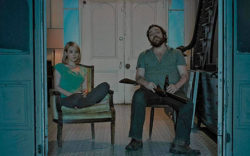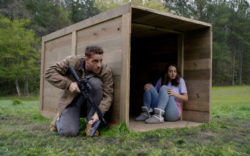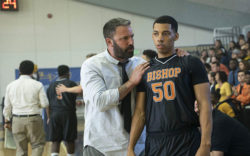Mel Gibson’s latest war epic brags about being from the director of Braveheart, when it is more by the writer of Braveheart who directed Gibson in We Were Soldiers. Gibson and screenwriters Andrew Knight and Robert Schenkkan have made a war movie constructed in two parts à la Full Metal Jacket.
For an hour plus, the unfair treatment of Private Desmond Doss (Andrew Garfield, sporting a suth-un accent that, like the sulfuric smell of a paper mill, becomes unnoticeable after a while), a conscientious objector who refuses to touch a rifle, is inelegantly recounted. A stable of Brits and Aussies—Hugo Weaving, Rachel Griffiths, Teresa Palmer, Sam Worthington and other, less recognizable actors—reenact small-minded bigotry and help Gibson perpetuate the “persecution of Christianity” narrative. Then Doss and the audience are thrust into battle at Okinawa’s Hacksaw Ridge, and the film becomes the smorgasbord of headshots, blown-off limbs and intestinal trails one would expect from a filmmaker as enamored with bloody violence as Gibson, who seems to be trying to out-offal The Passion and Apocalypto. Is that act of seppuku not the most Mel Gibson sequence of all time?
Still, the movie has the jingoistically patriotic effect expected by its target audience. (It is also starkly, angrily and un-anachronistically anti-Japanese.) The interviews with Doss, his captain and his brother that immediately precede the end credits bring home the incredible heroism of this real American hero, casting doubts on whether this story would have been more powerfully told by a documentary rather than a fictionalized feature. Nonetheless, Gibson again proves his superior capability to helm an action movie—the battle scenes carry the chaotic realism of Saving Private Ryan—provided his personal extremisms do not impede his vision.
Like what you just read? Support Flagpole by making a donation today. Every dollar you give helps fund our ongoing mission to provide Athens with quality, independent journalism.










